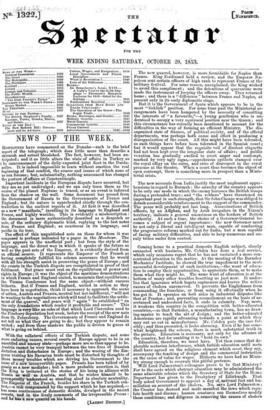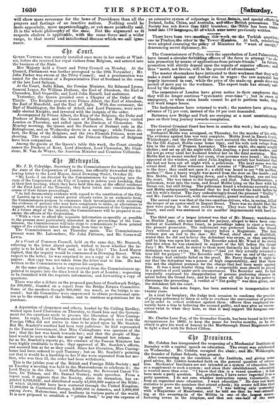Comin g home to a practical domestic En g lish subject, closely connected
with business, Mr. Cobden has done a real servioe, which only occasions regret that he has not sustained a more con- centrated attention to the matter. At the meeting of the Barnsley Mechanics' Institute, he showed the true impediment to the more successful development of such institutions,—the want of educa- tion to employ their opportunities, to appreciate them, or to make them what they might be. The same want of education is at the bottom of many other troubles besetting us just now. It under- lies that ignorance which begets supineness and leaves the active causes of cholera unremoved. It prevents the Englishman from commanding the franchise, or from using it effectually when he has got it. It operates on both sides in industrial disputes like that at Preston; and, preventing reconcilement on the basis of as- certained and understood facts, it ends in calamity. Nay, more,. it weakens this country in the competition with better-educated countries,—so that Barnsley, a manufacturing town, has no drair- ing-master to teach the art of design; and the better-educated Americans are rapidly advancing towards a point at which they may cut us out in manufactures. Mr. Cobden puts the case for- cibly; and thus presented, it looks alarming. Even if he has some- what heightened the colours, there is much substantial truth in the picture. Education is necessary, not only for the advance of the country, but for enabling it to "hold its own." Education, therefore, we must have. Yet then comes that de- plorable sectarian interference, which forbids education until sects shall have agreed on the religious element which must, they say, accompany the teaching of design and the commercial instruction on the cause of value for wages. Hitherto we have had no Minis- try strong enough to overrule this pitiful pretence. Lord rd Palmerston's colleagues prove to be that Ministry? For to the sects which obstruct education may be administered the same admirable rebuke which the Secretary of State for the Home Department has given to the Presbytery of Edinburgh. That body asked Government to appoint a day of, national fast and hu- miliation on account of the cholera. No, says Lord Palmerston ; the Creator has decreed and made manifest the laws which regu- late health and disease ; human creatures can themselves modify those conditions; and diligence in removing the causes of cholera will show more reverence for the laws of Providence than all the prayers and fastings of an inactive nation. Nothing could be more appositely, more unpratendIney, or yet-more pointedly said. It is the whole philosophy of the ease. But the argument as it respects cholera is applicable, with the same force land .a wider range, to that moral andintelleotual disease which,we-eall igno- rance.



























 Previous page
Previous page